Writer Without Borders, an Asian author who has shed light on Africa and its people
Interview: Pramudith D. Rupasingheby Sakshi Selvanathan 1) How has the journey you have made as an author been…
Interview: Pramudith D. Rupasinghe
by Sakshi Selvanathan
1) How has the journey you have made as an author been so far?
I have been working as a humanitarian diplomat for more than 17 years in different parts of the world, working in both natural disaster and conflict contexts, including the Global Ebola Response in West Africa. However, I started my writing career in 2016, very recently- almost 5 years ago. I have been writing a lot of unpublished stuff before early 2016. In 2016, I published my debut semi-fiction “Footprints in Obscurity”- 15 chapters of the book encapsulated stories about 29 countries out of 54 in the African continent. In November of the same year, I published “Behind the Eclipse”, a story set in 3 West African Countries – Liberia, Guinea and Sierra Leone, (that was the epicentre of the West African Ebola Crisis). Upon publishing “Behind the Eclipse” I started getting more and more international attention.
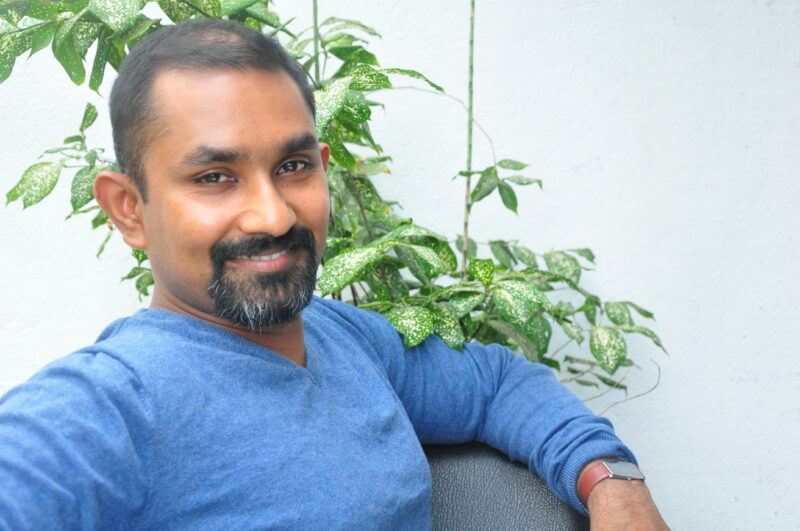
I think that the story is quite relevant to today’s context, as the lessons learnt from the Ebola crisis are very much relevant to the pandemic we are encountering today. While working as a humanitarian, I always had the chance to explore the unexplored of human life, the cultures that had not made contact with the external world, and people who have gone through such bad things that mere words can’t explain. In late 2018, my philosophical fiction “Bayan” came out. A story set in the North-Eastern tip of Ukraine (previously part of the Soviet Union), it is about a man who is living through a transitioning society, from the fall of the Soviet Union to today’s democratic Ukraine. The story explores ageing through very unorthodox dimensions. Bayan has been translated into Sinhala, Polish, Burmese, and German. Hindi and Hungarian translations will be out in 2021.
My latest piece of work will be out soon, and it is titled “Termites”. It’s a story set in Bangladesh, about a sex worker in the world-famous, largest open brothel – Kandapura in the Tegali district of Bangladesh – and her transformation into an activist who mobilised a world to fight against human trafficking forced sex labour and the rights of women and children in general. The book launch will be in multiple places, as we are planning to reveal translations (13 languages) at the same time.
Today, I am focusing more on writing than my humanitarian career as I believe that time has come to look at me differently, stick to what I prefer to do in my life, and do what allows me to sit back and reflect, and then give something to the world. At the same time, I am very grateful to all the organizations that have hosted me, as it was been always a win-win situation: the places where I lived pulled out the writer within me. And for me to be quoted by ‘The Daily Mirror’ as a “writer without borders” was because I was able to transcend those frontiers thanks to my profession. Therefore, I would not walk out from the humanitarian field anytime soon but the focus will be more on writing in the years to come.
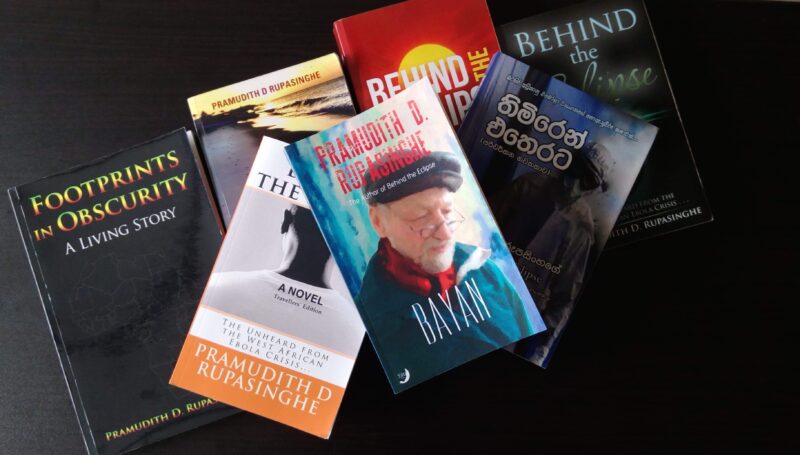
2. You have set all of your stories outside Sri Lanka. Is there a particular reason behind it?
There is a reason for that, as I was outside the country for the last decade, it was a time in which I was able to emerge as an author, I wrote about the things I came across or things that persuaded me to write about from the environments in which I lived, the people I interacted with, the lifestyles and cultures I came into contact with, and the issues encountered by the people around me. That is one reason why I have not written a story set in Sri Lanka yet. And I always made sure that I made a first-person contact with the places, people and cultures that are in my stories. So literally speaking, I lived in the places where I set the stories and I wrote while being in those locations. For instance, I wrote ‘Behind the Eclipse’ while I was in Liberia, ‘Footprints in Obscurity’ while travelling across the African continent, ‘Bayan’ while living in Sumy Region in northeastern Ukraine (I completed it in Burma), and I spent an ample amount of time in Bangladesh, in Cox Bazaar, and Dhaka while writing ‘Termites’. I went to Burma, northern Rakhine state and central Rakhine state for drafting my story ‘Rain of Fire’ – the story of a boy belonging to the Rohingya Muslim ethnic group- the most persecuted ethnicity on the earth so far. Therefore, the longest time I have ever lived in Sri Lanka after my authorship was 18 months. But in case I come back for a longer time and come across a good (by ‘good’ I mean not in the commercial sense but a valuable subject matter that could change the lives of people for the better, I will probably have a book set in Sri Lanka. We can’t predict that it should happen naturally.
3. Two of your books are set in or are about Africa. What is that special link?
I started my life as an author in Africa, or in other words, Africa was the entire inspiration for the first two books of mine – ‘Behind the Eclipse’ and ‘Footprints in Obscurity’. This was because of a few reasons: first of all, Africa is such a rich continent in terms of its diverse culture, colours, intact nature that one would find nowhere else, value systems and history. It can offer you the whole world in one single continent of 54 countries. It carries both traces of majestic empires, civilisations as well as painful wounds – still bleeding – of imperialism and recent conflicts. For me, Africa was at first an eye-opener, it ruthlessly challenged all my stereotypes that one who had never been to Africa would possess. It transformed me to a human being who began to see the world afresh, totally destabilising the well-concreted stereotypical narratives.
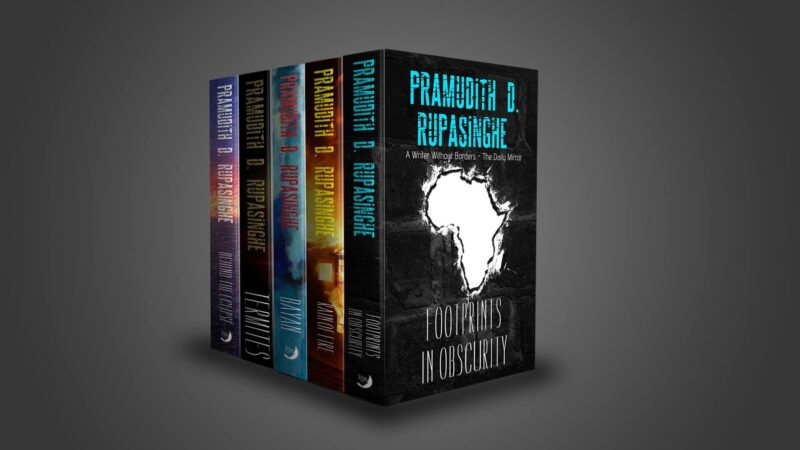
Its rich cultures from Morocco to South Africa, South Africa to Djibouti, the diverse natural world from dense tropical forests in Congo, Liberia, Central Africa and Ghana, the harsh deserts in Sahel region to semi-deserts in Namibia and Botswana, the surviving kingdoms of Lesotho and Swaziland, the wisdom of people I came across in the busy bazaars of Dakar, Lomé and Tunisia, the traces of ancient civilisation that people outside Africa would not talk about much – such as Nubia along the Nile Basin, Mali empire, Ashanti Empire, Great Rhodesia, and also, the unparalleled challenges faced by those countries such as the wealth, resource-centric crises, epidemics, poverty and irreparable devastation wrought by colonisation. Above all, I was inspired by the people’s incomparable resilience in enduring the challenges of life. Do you think these are not adequate to provoke someone to take a pen and write? I think that certainly happened to me.
And I lived in a critical time of the continent: on one hand, there were societies such as that of Liberia, Ivory Coast and Sierra Leone which were recovering from the devastating civil conflicts while on the other hand, fresh conflicts had broken out in South Sudan, the Central African Republic, Mali and Libya, while DR Congo’s future remained unclear. Besides, the deadly Ebola epidemic hit the countries that were trying to lift their head from decades-long conflicts hard. So I think as a result of all this, my first two books were bound to be set in Africa.
4. Is there a particular character in your books that you personally resonate with and think that his or her life story would be inspirational to readers of the contemporary world?
Though many of my worldly observations are reflected in the thoughts of all my characters, Tamba from ‘Behind the Eclipse’ (or ‘George’ as he later comes to be known) is truly a character into which I have fed my personal beliefs and as well as the discoveries I have made in my own humanitarian career. Without a doubt, there were revelations throughout my career that have truly altered my perspective – one being the importance of local knowledge in delivering effective humanitarian assistance to those living in areas ravaged by conflict and disease. And to answer your question, in today’s world, which has been totally transformed by the COVID-19 pandemic, George’s exhortations (based on his experience with the Ebola response in Africa) would certainly resonate with all of us and would hopefully be put to good use by frontline workers as well.
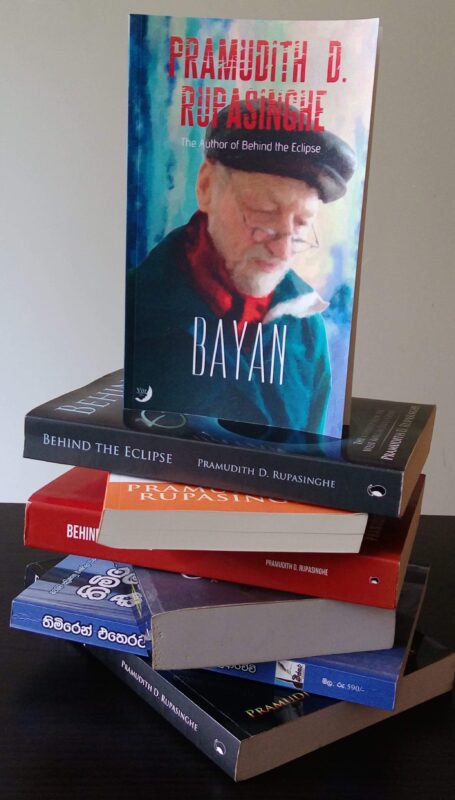
5. What inspired you to write and what keeps you going?
My work allows me always to sit on the rupture and see how deep it is. I have seen the worst of human situations and witnessed the extremes of human suffering – such situations would have a traumatic impact on anyone. With exposure to such events, therefore, writing is actually very therapeutic as I think I might have implied above a few times (smiling). That itself is an inspiration. And furthermore, every single human being has something to share and every life has life-changing power. But unfortunately, in this world, most people die unheard, and their moving stories that could inspire millions of others, go six feet under the earth along with them, completely unheard. I think I try my best to pick those that my eyes come into contact with and take them out to the world.
So what I’m trying to say is that I do not choose to write about anything and everything. When I come across a theme or subject matter, I always look at the impact of the story in terms of ‘social change’.
If you ask me what inspires me and what and who keeps me going, I would simply say: ‘People and their stories’ – as I have told this in several other interviews. As an author, I try my best to bring the stories of people to the surface of the world, and share them with millions of others, across the borders, ethnicities and faiths. These types of differences do not hinder me, and this is probably why the ‘Daily Mirror’ tagged me as a “writer without borders” (laughing).
6. How do we encourage more authors around the world? How can they help themselves?
I believe that the authors need to think global. Sometimes, many of us pitch our stories to a predetermined segment of the population, but I’m not saying that everyone does it. I strongly believe that every story has global relevance, every story can connect dots fragmented across the world. I have seen many authors limit themselves to their countries, continents etc. And even the reviews and review platforms are also very much in the same line, mostly limited to countries, continents and sometimes even to races. Sometimes I feel it’s a defence wall, but it is, in my opinion, limiting themselves. We live spread across the world, I understand we all have differences, but more than the differences we have similarities, and so do our stories. My message to the authors is: do not deprive yourself of your right to be heard globally, because every story has global relevance. They need to take their stories the full distance. For the reviewers who have continental and country-level limitations, I would like to tell them not to be “barriers” to literature’s inborn nature to be “universal”. Instead, they need to be the ones who should take national and regional level writing to the next level.
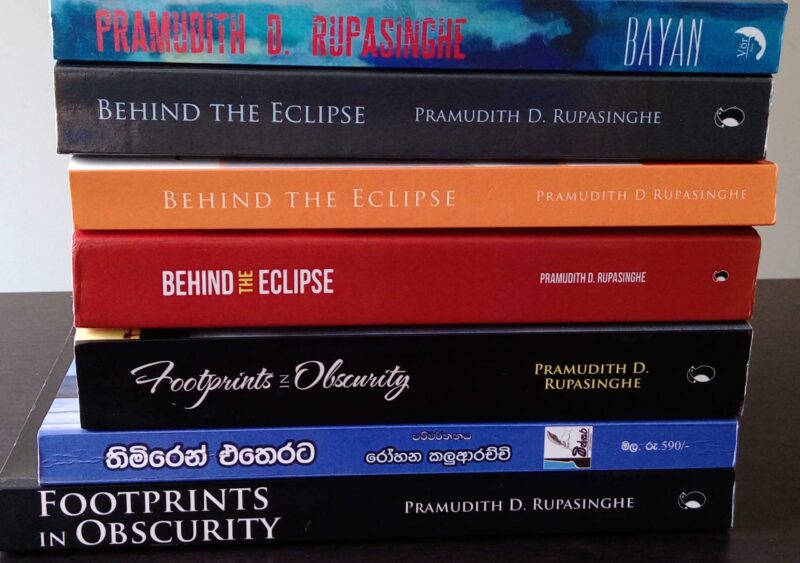
7. What are you passionate about and how does this complement your vision for the future?
I am an explorer of cultures, the diversity of people and the world we live in. Cultures are intangible heritages of people and every culture, irrespective of its spread or size, needs to be given equal recognition, respect and value. There is no such thing that one culture is greater than the other, and that is a dangerous notion. Throughout history, we have learnt that the reality of evolution is that stronger cultures conquer the weaker ones, or weaker ones absorb the stronger ones, and they are all extremely dynamic. I think in all my work, I have demonstrated a profound understanding of the culture of the place where the story is set.
8, What is your message to the world?
Use your feet and travel, explore the unexplored, and share your good stories with the world. Every single human is charged with an enormous level of energy that could mobilise millions of others. The issue is that we do not use it right, use it constructively. My request is to use your human life for the wellbeing and good of our fellow human beings, then your story will live beyond your lifetime.
9, ‘Writers never stop writing’. Do you have anything to hint about in the days ahead?
“Termites” will be released in 2021, and my readership can expect it in the first half of the year. Except for the fact that the story is set in Bangladesh, I will not reveal much about it for now.